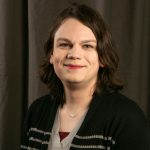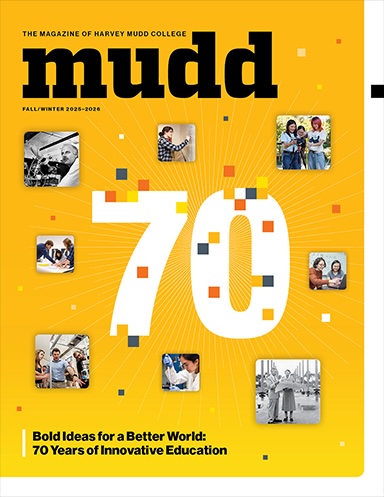Harvey Mudd Faculty Promotions, Summer 2023
June 26, 2023
Promotions and tenure appointments for Harvey Mudd College faculty were approved by the board of trustees at its May meeting. Upon discussion and the recommendation of the Academic Affairs Committee, the board unanimously approved these appointments:
Tenure Awarded

Erin Talvitie, associate professor of computer science, associate department chair and a faculty member since 2019, has earned tenure. Before coming to Harvey Mudd, Talvitie helped establish Franklin & Marshall College’s computer science major. She specializes in applying machine learning to problems of artificial intelligence, working toward artificial autonomous agents that can learn to act flexibly and competently in unknown environments. She approaches these questions using tools in machine learning and artificial intelligence, especially in the area of reinforcement learning.
Promotion to full professor
Lelia Hawkins, director of the Hixon Center for Climate and the Environment and Hixon Professor of Climate Studies, has been a member of the Department of Chemistry since 2011. Hawkins studies how atmospheric particles in urban settings (like smog) are transformed as they age and how they impact the temperature of the earth. An NSF CAREER award recipient, Hawkins is one of the researchers measuring airborne particulate matter as part of a $12 million, multi-state project. A 2018 NSF grant has allowed Hawkins to take students to perform research at the Multiphase Atmospheric Experimental Simulation Chamber located in Créteil, France. As Hixon Center director, Hawkins is working to develop and expand the College’s undergraduate climate curriculum, research and campus practice.
Mohamed Omar (mathematics) specializes in algebraic methods in graph theory and combinatorics and has been a faculty member since 2013. In 2018, he won the Henry L. Alder Award from the Mathematical Association of America in recognition of his outstanding undergraduate teaching and dedication to inclusion in STEM education. In 2021, he received the inaugural AMS Claytor-Gilmer Fellowship, a yearlong fellowship that aims to further excellence in mathematics research. He has served on organizing committees for the American Mathematics Competitions and Canadian competitions through the Center for Education in Mathematics and Computing, and he is a member of the EDGE Foundation’s 2020 inaugural class of Karen EDGE Fellows.
Katherine Van Heuvelen joined the chemistry faculty in 2012. Her lab draws inspiration from nature to develop new, environmentally friendly catalysts to remediate carcinogenic pollutants. In addition to her scholarship in bioinorganic chemistry, she is active in chemical education research. She currently serves as associate dean of faculty, which includes work in faculty development, research and experiential learning, and diversity, and she is the R. Michael Shanahan Professor of Chemistry. In 2018, she was a fellow in the Claremont Faculty Leadership Program, and she received the College’s Outstanding Faculty Member award in 2022.
Ben Wiedermann joined the computer science faculty as a visiting professor in 2011 and became a tenure-track professor in 2012. He served as the Core Curriculum director and helped facilitate the recent review and revision of the Core. He studies the design and implementation of accessible programming languages, with an emphasis on designing languages for people who might not consider themselves to be programmers. His research collaborators include artists, mathematicians, puzzlers, physicists and educators. He also co-teaches Mudd’s Performing Shakespeare course, with Professor of Literature Ambereen Dadabhoy.
Appointed for Second, Two-year Term as Assistant Professor
Joshua Brake (engineering), appointed in 2019, studies biophotonics, a field at the intersection of optics and biology that is increasingly playing a role in biomedical diagnostics and therapies. This year, he received an NSF CAREER award for a project to exploit the light-piping property of plant stems and roots to develop the next generation of optical tools and an NSF Engineering Research Initiation grant geared toward improving the delivery of light to the brain using flexible multicore fibers. In 2022, he received a grant from the Research Corporation for Science Advancement and the Chan Zuckerberg Initiative to develop a modular, inexpensive, open-source and multi-modal in vivo imaging system to democratize access to bioimaging. Brake and colleague Kevin Cash, a professor at Colorado School of Mines, are co-investigators on the grant. In addition to his research projects, Brake teaches courses in digital design and embedded systems and has served for the past two years on the teaching team for the sophomore-level experimental engineering course (E80) that is taken by all engineering majors. He is passionate about supporting the engineering department’s curricular and co-curricular offerings related to the Prototyping Mindset and loves using these opportunities to help students cultivate a design thinking approach to their college experience and lives.
Steven Santana joined the engineering faculty in 2019 after one year as a visiting professor. Santana teaches courses across the engineering curriculum with a focus on engineering design and fluid mechanics. He and his students are employing learning from across STEM fields, including engineering, biology, chemistry and materials science, to enhance the understanding of cell communication through extracellular vesicles and to design systems for bioprinting. The goal of a recently funded NSF project is to create knowledge about extracellular vesicle production in astrocytes (a cell type found in the central nervous system) in response to matrix properties.
Xanda Schofield ’13 joined the Department of Computer Science in 2019. She specializes in designing easy-to-use tools for large-scale corpus text mining, with a focus on distributional semantic models. She also works on interdisciplinary text analysis projects in areas such as economics and climate science. She is co-principal investigator with George Montañez on a grant, funded this year by the NSF, to support projects with the theme “Exploring the Limits of Intelligent Systems.” Funding for this research experience for undergraduates will support approximately 10 students per summer for the next three years.
